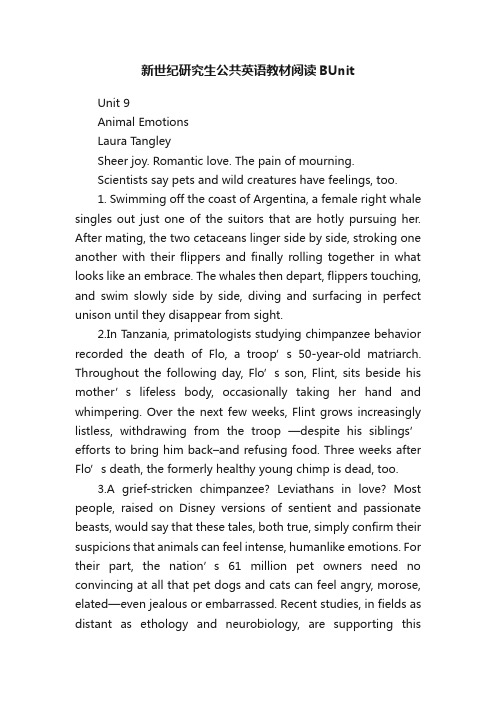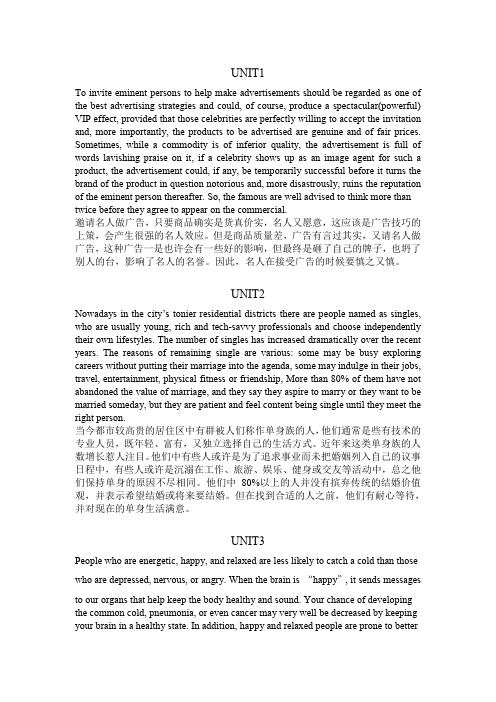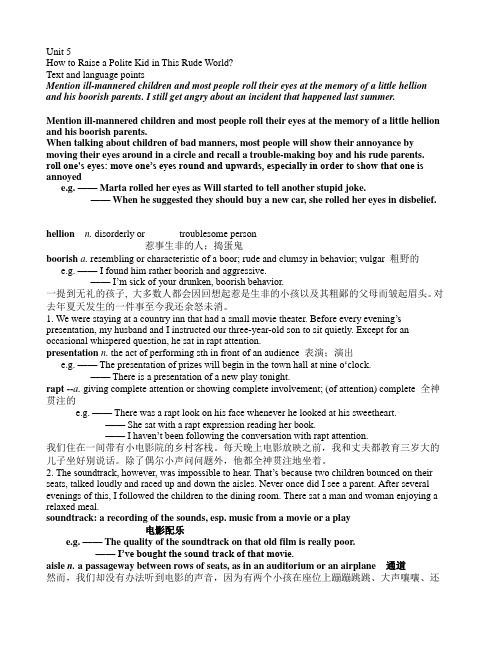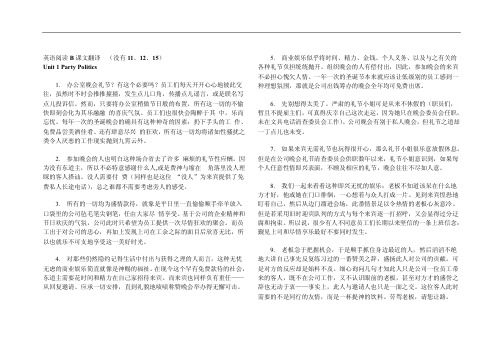新世纪研究生公共英语教材阅读B 课文原文及翻译
新世纪研究生公共英语教材阅读BUnit

新世纪研究生公共英语教材阅读BUnitUnit 9Animal EmotionsLaura TangleySheer joy. Romantic love. The pain of mourning.Scientists say pets and wild creatures have feelings, too.1. Swimming off the coast of Argentina, a female right whale singles out just one of the suitors that are hotly pursuing her. After mating, the two cetaceans linger side by side, stroking one another with their flippers and finally rolling together in what looks like an embrace. The whales then depart, flippers touching, and swim slowly side by side, diving and surfacing in perfect unison until they disappear from sight.2.In Tanzania, primatologists studying chimpanzee behavior recorded the death of Flo, a troop’s 50-year-old matriarch. Throughout the following day, Flo’s son, Flint, sits beside his mother’s lifeless body, occasionally taking her hand and whimpering. Over the next few weeks, Flint grows increasingly listless, withdrawing from the troop —despite his siblings’ efforts to bring him back–and refusing food. Three weeks after Flo’s death, the formerly healthy young chimp is dead, too.3.A grief-stricken chimpanzee? Leviathans in love? Most people, raised on Disney versions of sentient and passionate beasts, would say that these tales, both true, simply confirm their suspicions that animals can feel intense, humanlike emotions. For their part, the nation’s 61 million pet owners need no convincing at all that pet dogs and cats can feel angry, morose, elated—even jealous or embarrassed. Recent studies, in fields as distant as ethology and neurobiology, are supporting thispopular belief. Other evidence is merely anecdotal, especially for pets — dogs that become depressed, or even die, after losing a beloved companion, for instance. But the anecdote —or case study in scientific parlance—has now achieved some respectability among researchers who study animal behavior. As University of Colorado biologist Marc Bekoff says, “The plural of anecdote is data.”4.Still, the idea of animals feeling emotions remains controversial among many scientists. Researchers’ skepticism is fueled in part by their professional aversion to anthropomorphism, the very nonscientific tendency to attribute human qualities to non-humans. Many scientists also say that it is impossible to prove animals have emotions using standard scientific methods —repeatable observations that can be manipulated incontrolled experiments —leading them to conclude that such feelings must not exist. Today, however, amid mounting evide nce to the contrary, “the tide is turning radically and rapidly,” says Bekoff, who is at the forefront of this movement.5.Even the most strident skeptics of animal passion agree that many creatures experience fear —which some scientists defin e as a “primary” emotion that contrasts with “secondary” emotions such as love and grief. Unlike these more complex feelings, fear is instinctive, they say, and requires no conscious thought. Essential to escape predators and other dangers, fear —and its predictable flight, fight, or freeze responses — seems to be hard-wired into many species. Young geese that have never before seen a predator, for example, will run for cover if a hawk-shaped silhouette passes overhead. The shape of a nonpredatory bird, on the other hand, elicits no such response.6.But beyond such instinctual emotions and their predictable behavioral responses, the possibility of more complex animal feelings —those that entail mental processing —is difficult to demonstrate. “I can’t even p rove that another human being is feeling happy or sad,” says Bekoff, “but I can deduce how they’re feeling through body language and facial expression.” As a scientist who has conducted field studies of coyotes, foxes, and other canines for the past three decades, Bekoff also believes he can accurately tell what these animals are feeling by observing their behavior. He adds that animal emotions may actually be more knowable than those of humans, because they don’t “filter” their feelings the way we do.7.Yet because feelings are intangible, and so tough to study scientifically, “most researchers don’t even want to talk about animal emotions,” says Jaak Panksepp, a neuroscientist at Bowling Green State University in Ohio and author of Affective Neuroscience. Within his field, Panksepp is a rare exception, who believes that similarities between the brains of humans and other animals suggest that at least some creatures have true feelings. “Imagine where we’d be in physics if we hadn’t infer red what’s inside the atom,” says Panksepp. “Most of what goes on in nature is invisible, yet we don’t deny that it exists.”8.The new case for animal emotions comes in part from the growing acceptability of field observations, particularly when they are taken in aggregate. The latest contribution to this body of knowledge is a new book, The Smile of a Dolphin, which presents personal reports from more than 50 researchers who have spent their careers studying animals —from cats, dogs, bears, and chimps to birds, iguanas, and fish. Edited by Bekoff, who says it will finally “legitimize” research on animal emotions,thevolume has already garnered scientific attention, including a Smithsonian Institution symposium on the subject.9. One of the most obvious animal emotions is pleasure. Anyone who has ever held a purring cat or been greeted by a bounding, barking,tail-wagging dog knows that animals often appear to be happy. Beastly joy seems particularly apparent when the animals are playing with one another or sometimes, in the case of pets, with people.10.Virtually all young mammals, as well as some birds, play, as do adults of many species such as our own. Young dolphins, for instance, routinely chase each other through the water like frolicsome puppies and have been observed riding the wakes of boats like surfers. Primatologist Jane Goodall, who has studied chimpanzees in T anzania for four decades, says that chimps “chase, somersault, and pirouette around one another with the abandon of children.” In Colorado, Bekoff once watc hed an elk race back and forth across a patch of snow — even though there was plenty of bare grass nearby —leaping and twisting its body in midair on each pass. Though recent research suggests that play may help youngsters develop skills needed in adulthood, Bekoff says there’s no question that it’s also fun. “Animals at play are symbols of the unfettered joy of life,” he says11.Grief also seems to be common in the wild, particularly following the death of a mate, parent, offspring, or even close companion. Female sea lions witnessing their pups being eaten by killer whales are known to actually wail. When a goose, which mates for life, loses its partner, the bird’s head and body droop dejectedly. Goodall, who saw the young chimp Flint starve afterhis moth er died, maintains that the animal “died of grief.”12.Elephants may be nature’s best-known mourners. Scientists studying these behemoths have reported countless cases of elephants trying to revive dead or dying family members, as well as standing quietly beside an animal’s remains for many days, periodically reaching out and touching the body with their trunks. Kenyan biologist Joyce Poole, who has studied African elephants since 1976, says these animals’ behavior toward their dead “leaves me with little d oubt that they experience deep emotions and have some understanding about death.”13.But there’s “hard” scientific evidence for animal feelings as well. Scientists who study the biology of emotions, a field still in its infancy, are discovering many similarities between the brains of humans and other animals. In animals studied so far, including humans, emotions seem to arise from ancient parts of the brain that are located below the cortex,。
5-8新世纪研究生英语阅读B课文 答案 翻译

e.g. —— We were dumbfounded by all the damage done by the storm.
—— Victor stared dumbfounded as the woman continued to scream abuse at him.
—— I’ve bought the sound track of that movie.
aisle n. a passageway between rows of seats, as in an auditorium or an airplane 通道
然而,我们却没有办法听到电影的声音,因为有两个小孩在座位上蹦蹦跳跳、大声嚷嚷、还在过道上跑来跑去。我从来没有见到过他们的家长在场。就这样过了几个晚上, 有一次,我就跟踪这两个孩子到了餐厅。在那里有一男一女正清闲地吃着饭。
—— She stood back and regarded him coldly.
facility n. buildings, equipment and services provided for a particular purpose; sth that facilitates an action or process 设施,设备
—— He was consumed with guilt after the accident.
—— I haven’t been following the conversation with rapt attention.
我们住在一间带有小电影院的乡村客栈。每天晚上电影放映之前,我和丈夫都教育三岁大的儿子坐好别说话。除了偶尔小声问问题外,他都全神贯注地坐着。
新世纪研究生公共英语教材阅读BUnit

Unit 9Animal EmotionsLaura TangleySheer joy. Romantic love. The pain of mourning.Scientists say pets and wild creatures have feelings, too.1. Swimming off the coast of Argentina, a female right whale singles out just one of the suitors that are hotly pursuing her. After mating, the two cetaceans linger side by side, stroking one another with their flippers and finally rolling together in what looks like an embrace. The whales then depart, flippers touching, and swim slowly side by side, diving and surfacing in perfect unison until they disappear from sight.2.In Tanzania, primatologists studying chimpanzee behavior recorded the death of Flo, a troop’s 50-year-old matriarch. Throughout the following day, Flo’s son, Flint, sits beside his mother’s lifeless body, occasionally taking her hand and whimpering. Over the next few weeks, Flint grows increasingly listless, withdrawing from the troop —despite his siblings’ efforts to bring him back–and refusing food. Three weeks after Flo’s death, the formerly healthy young chimp is dead, too.3.A grief-stricken chimpanzee? Leviathans in love? Most people, raised on Disney versions of sentient and passionate beasts, would say that these tales, both true, simply confirm their suspicions that animals can feel intense, humanlike emotions. For their part, the nation’s 61 million pet owners need no convincing at all that pet dogs and cats can feel angry, morose, elated—even jealous or embarrassed. Recent studies, in fields as distant as ethology and neurobiology, are supporting this popular belief. Other evidence is merely anecdotal, especially for pets — dogs that become depressed, or even die, after losing a beloved companion, for instance. But the anecdote —or case study in scientific parlance—has now achieved some respectability among researchers who study animal behavior. As University of Colorado biologist Marc Bekoff says, “The plural of anecdote is data.”4.Still, the idea of animals feeling emotions remains controversial among many scientists. Researchers’ skepticism is fueled in part by their professional aversion to anthropomorphism, the very nonscientific tendency to attribute human qualities to non-humans. Many scientists also say that it is impossible to prove animals have emotions using standard scientific methods —repeatable observations that can be manipulated incontrolled experiments —leading them to conclude that such feelings must not exist. Today, however, amid mounting evide nce to the contrary, “the tide is turning radically and rapidly,” says Bekoff, who is at the forefront of this movement.5.Even the most strident skeptics of animal passion agree that many creatures experience fear —which some scientists define as a “primary” emotion that contrasts with “secondary” emotions such as love and grief. Unlike these more complex feelings, fear is instinctive, they say, and requires no conscious thought. Essential to escape predators and other dangers, fear — and its predictable flight, fight, or freeze responses — seems to be hard-wired into many species. Young geese that have never before seen a predator, for example, will run for cover if a hawk-shaped silhouette passes overhead. The shape of a nonpredatory bird, on the other hand, elicits no such response.6.But beyond such instinctual emotions and their predictable behavioral responses, the possibility of more complex animal feelings —those that entail mental processing —is difficult to demonstrate. “I can’t even prove that another human being is feeling happy or sad,” says Bekoff, “but I can deduce how they’re feeling through body language and facial expression.” As a scientist who has conducted field studies of coyotes, foxes, and other canines for the past three decades, Bekoff also believes he can accurately tell what these animals are feeling by observing their behavior. He adds that animal emotions may actually be more knowable than those of humans, because they don’t “filter” their feelings the way we do.7.Yet because feelings are intangible, and so tough to study scientifically, “most researchers don’t even want to talk about animal emotions,” says Jaak Panksepp, a neuroscientist at Bowling Green State University in Ohio and author of Affective Neuroscience. Within his field, Panksepp is a rare exception, who believes that similarities between the brains of humans and other animals suggest that at least some creatures have true feelings. “Imagine where we’d be in physics if we hadn’t infer red what’s inside the atom,” says Panksepp. “Most of what goes on in nature is invisible, yet we don’t deny that it exists.”8.The new case for animal emotions comes in part from the growing acceptability of field observations, particularly when they are taken in aggregate. The latest contribution to this body of knowledge is a new book, The Smile of a Dolphin, which presents personal reports from more than 50 researchers who have spent their careers studying animals —from cats, dogs, bears, and chimps to birds, iguanas, and fish. Edited by Bekoff, who says it will finally “legitimize” research on animal emotions, thevolume has already garnered scientific attention, including a Smithsonian Institution symposium on the subject.9. One of the most obvious animal emotions is pleasure. Anyone who has ever held a purring cat or been greeted by a bounding, barking,tail-wagging dog knows that animals often appear to be happy. Beastly joy seems particularly apparent when the animals are playing with one another or sometimes, in the case of pets, with people.10.Virtually all young mammals, as well as some birds, play, as do adults of many species such as our own. Young dolphins, for instance, routinely chase each other through the water like frolicsome puppies and have been observed riding the wakes of boats like surfers. Primatologist Jane Goodall, who has studied chimpanzees in Tanzania for four decades, says that chimps “chase, somersault, and pirouette around one another with the abandon of children.” In Colorado, Bekoff once watched an elk race back and forth across a patch of snow — even though there was plenty of bare grass nearby —leaping and twisting its body in midair on each pass. Though recent research suggests that play may help youngsters develop skills needed in adulthood, Bekoff says there’s no question that it’s also fun. “Animals at play are symbols of the unfettered joy of life,” he says11.Grief also seems to be common in the wild, particularly following the death of a mate, parent, offspring, or even close companion. Female sea lions witnessing their pups being eaten by killer whales are known to actually wail. When a goose, which mates for life, loses its partner, the bird’s head and body droop dejectedly. Goodall, who saw the young chimp Flint starve after his mother died, maintains that the animal “died of grief.”12.Elephants may be nature’s best-known mourners. Scientists studying these behemoths have reported countless cases of elephants trying to revive dead or dying family members, as well as standing quietly beside an animal’s remains for many days, periodically reaching out and touching the body with their trunks. Kenyan biologist Joyce Poole, who has studied African elephants since 1976, says these animals’ behavior toward their dead “leaves me with little doubt that they experience deep emotions and have some understanding about death.”13.But there’s “hard” scientific evidence for animal feelings as well. Scientists who study the biology of emotions, a field still in its infancy, are discovering many similarities between the brains of humans and other animals. In animals studied so far, including humans, emotions seem to arise from ancient parts of the brain that are located below the cortex,。
新世纪研究生英语公共英语教材B课后翻译答案全

UNIT1To invite eminent persons to help make advertisements should be regarded as one of the best advertising strategies and could, of course, produce a spectacular(powerful) VIP effect, provided that those celebrities are perfectly willing to accept the invitation and, more importantly, the products to be advertised are genuine and of fair prices. Sometimes, while a commodity is of inferior quality, the advertisement is full of words lavishing praise on it, if a celebrity shows up as an image agent for such a product, the advertisement could, if any, be temporarily successful before it turns the brand of the product in question notorious and, more disastrously, ruins the reputation of the eminent person thereafter. So, the famous are well advised to think more than twice before they agree to appear on the commercial.邀请名人做广告,只要商品确实是货真价实,名人又愿意,这应该是广告技巧的上策,会产生很强的名人效应。
Unit 5新世纪研究生英语阅读B课文 答案 翻译

Unit 5How to Raise a Polite Kid in This Rude World?Text and language pointsMention ill-mannered children and most people roll their eyes at the memory of a little hellion and his boorish parents. I still get angry about an incident that happened last summer.Mention ill-mannered children and most people roll their eyes at the memory of a little hellion and his boorish parents.When talking about children of bad manners, most people will show their annoyance by moving their eyes around in a circle and recall a trouble-making boy and his rude parents. roll one's eyes: move one’s eyes round and upwards, especially in order to show that one is annoyede.g. —— Marta rolled her eyes as Will started to tell another stupid joke.—— When he suggested they should buy a new car, she rolled her eyes in disbelief. hellion n. disorderly or troublesome person惹事生非的人;捣蛋鬼boorish a. resembling or characteristic of a boor; rude and clumsy in behavior; vulgar 粗野的e.g. —— I found him rather boorish and aggressive.——I‟m sick of your drunken, boorish behavior.一提到无礼的孩子, 大多数人都会因回想起惹是生非的小孩以及其粗鄙的父母而皱起眉头。
新世纪研究生公共英语教材阅读B课文翻译

� 。排 安来洽融系关否是间互相个照按样那单名柬请象不也间事同中作工且而 �系关密亲的间之人家了响影经已作工出外为因 。好更会果效加参友朋或偶 配工员请邀是但。行举内间时班上在并�加参工员部内于限只以可会晚司 公(。名姓的友朋或偶配的行同写填己自工员让以可过不。事的楚清查以难 到感都主雇的智明位一何任和姐小节礼令是会晚席出伴结谁和谁 .02
。人的 出付谢感该应到识意�说是就也——番一谢回该应到识意会也人客的懂懵 最是使即�时此。临光的他谢感�手的宾来的开离想位每住握�处口出的 眼抢在站地动不也动一们板老时此。列队客送个一外另需还�后最.52 。题话的外之作工谈高何如得懂工员该出现表以可样这 为因�围解司上的面局尬尴入陷替是而�司上求恳是不会机正真的升晋途 仕求寻工员外另。堪难很会为行种这光目的客好人主于碍中会晚人私在但 �责指人无法做的酒喝少量尽或绝拒中会晚司公在。点点指指人被会不就 点一守保稍稍得穿道知们他为因�样一司上与得穿会工员的明聪 .42
在�道报的局计统家国国法据。的低最中录记的年 061 在率婚结的国英 在现。话的婚结要还们他果如——了晚更也婚结且并了多更婚离、了长更 命寿们他为因�活生自独入步在人洲欧的多越来越。击冲大巨生产活生私 的人洲欧对都军大业产入进女妇量大及以性动流到渡过性定稳从化文业商 、命革的术技信通。分部成组的势趋义主人个的拒抗可不纪世个上是渡过 的式模活生身独到活生庭家从种这论评曼夫考·特劳克·让家学会社国法 。迎欢遍普的人类这商告广和商展发产地房、家学口人到受�象气新济经洲 欧是而�考思生人的观悲是不这。活生身独过定决就候时的轻年很在人洲 欧的多越来越是但。人一独单是将都终最们我�言所们人圣如正 .3 ” 。长成地扰干受不并择选权有人个一为作我。省反我自间空和间时有我使 活生自独是但。往交人与欢喜我�交社恶厌不我“ �说她。活生身单着论谈 地溢洋情热中歇间的话电打在�机手着抓手一另�盘向方着扶手一�风着 兜黎巴在地速快车汽小牌 ITG floG 国德的亮漂着开她。果结的功成业事 是成看寓公的己自和活生立独有拥把她 �家行银黎巴的岁 92 个是莱戈尔 克·白莎丽伊 。人的样这莱戈尔克 ·白莎丽伊像是而�夫鳏和女处老的槁枯 容面些那去过像再不族身单的在现。了返复不去一经已子日些那 .2
(完整word版)研究生公共英语教材阅读B第3、4、10、11、14课文原文及翻译

Unite 3 Doctor's Dilemma: Treat or Let Die?Abigail Trafford1。
Medical advances in wonder drugs,daring surgical procedures,radiation therapies,and intensive—care units have brought new life to thousands of people. Yet to many of them, modern medicine has become a double-edged sword。
2。
Doctor’s power to treat with an array of space—age techniques has outstripped the body's capacity to heal. More medical problems can be treated,but for many patients,there is little hope of recovery. Even the fundamental distinction between life and death has been blurred。
3。
Many Americans are caught in medical limbo, as was the South Korean boxer Duk Koo Kim,who was kept alive by artificial means after he had been knocked unconscious in a fight and his brain ceased to function。
With the permission of his family,doctors in Las Vegas disconnected the life-support machines and death quickly followed。
新世纪研究生公共英语教材阅读b原文翻译unit-10

Unit 10 Is Science Dangerous? Uite10课文译文科学危险吗?Lewis Wolpert 刘易斯·沃尔珀特Does society need protecting from scientific advances? Most emphatically not, so long as scientists themselves and their employers are committed to full disclosure of what they know.人类社会需要保护以抵挡科学发展带来的危险吗?当然不需要,只要科学家及其雇主们致力于公开他们所知道的一切详情。
1. The idea that knowledge is dangerous is deeply embedded in our culture. Adam and Eve were forbidden to eat from the biblical Tree of Knowledge, and in Milton’s Paradise Lost the ser pent addresses the Tree as the ―Mother of Science‖. The archangel Raphael advises Adam to be ―lowly wise‖when he tries to question him about the nature of the Universe. Indeed, Western literature is filled with images of scientists meddling with nature, with disastrous results. Scientists are portrayed as a soulless group, unconcerned with ethical issues.1.知识是危险的这一观念在我们的文化中根深蒂固。
- 1、下载文档前请自行甄别文档内容的完整性,平台不提供额外的编辑、内容补充、找答案等附加服务。
- 2、"仅部分预览"的文档,不可在线预览部分如存在完整性等问题,可反馈申请退款(可完整预览的文档不适用该条件!)。
- 3、如文档侵犯您的权益,请联系客服反馈,我们会尽快为您处理(人工客服工作时间:9:00-18:30)。
新世纪研究生公共英语教材阅读B课文原文及翻译Unit1Party PoliticsJudith Martin1. Etiquette at an office party? Why, these people have been socializing happily every working day of their lives, give or take a few melees, rumors, and complaint petitions. All it takes to turn this into holiday merriment is a bit of greenery looped around the office—the staff will soon be looped, too. Surely it is enough that the annual Christmas party has the magic ingredients: time off from work, free food and drink, and a spirit of fun replacing such ugly work realities as sexual harassment.2. Furthermore, partygoers figure, it offers relief from such pesky obligations as thanking anyone or being kind to wallflowers because there really aren‟t any hosts. Nobody has to pay (that same Nobody who generously provides the telephone line for long-distance personal calls), and so nobody‟s feelings need be considered.3. This is all pure hospitality—there for the taking, like the office-supplied felt-tipped pens everyone has been pocketing all year. Out of the natural goodness of its corporate heart and the spirit of the holiday season, the company wishes only to give its employees a roaring good time, and the employees, out of loyalty and the thrill of getting to know their bosses off-duty as equals, delight in the opportunity.4. For those still dimly aware of the once-standard give-and-take of real social life, this no-fault approach to business entertaining seems a godsend. In the now-rare domain of genuine society, hosts are supposed to plan and pay for the entertainment of their guests, on their own time and in their own houses. Guests have strict duties, as well—from answering invitations to cooperating with all arrangements, even to the extent of pronouncing them perfectly lovely.5. Business entertaining appears to remove the burdens of time, effort, money, individual responsibility—and the etiquette connected with them. The people who do the planning are paid for their trouble, so those who benefit need not consider they have incurred a debt. Why, the annual Christmas party ought to be an inspiration to lower-level employees to work their way into realms where company-sponsored partying can be enjoyed all year long.6. Not so fast. Flinty Miss Manners does not recognize any holidays from etiquette. (Employees, if not employers, should consider themselves lucky that she is only on the Party Committee, not the one that might take up ethical questions about those pens and calls.) Office parties differ from private ones but are no freer from rules.7. If it were indeed true that everyone has a better time without etiquette, Miss Manners could easily be persuaded to take the day off. But having long served on the Office Party Etiquette Cleanup subcommittee, she is aware that things generally do not go well when there is no recognized etiquette and everyone is forced to improvise.8. Let us look at all this spontaneous, carefree fun: There being no proper place for the boss, he or she hangs around the door, concerned about mixing with everyone. It might discourage hospitable bosses to see guests staring at them in horror and then slithering in by a side door. But etiquette‟s solution of having everyone greeted in a receiving line was rejected as too stiff. So one can hardly blame employees for recalling a long-ingrained principle of the workplace: Seeing the boss and having a good time are best not scheduled at the same time.9. Desperate to make the time count, the boss grabs the nearest available person and startsdelivering practiced words about the contribution he makes to their great enterprise. The reaction is not quite what was hoped for. Discreet questioning establishes that this is an employee‟s guest. He doesn‟t work for the company, recognize the boss, or appreciate the attention—and, as a matter of fact, has only a passing acquaintance with the employee who issued the invitation. What this guest wants is not professional fellowship but a fresh drink, if the boss would kindly step out of the way.10. Now, the reason the invitation said “and guest” was to avoid the ticklish issue of who is still married to whom and what the spouse calls itself. Last year, unmarried employees were furious when their partners were not included, and married employees complained that the forms by which their spouses were addressed were offensive: “Mrs.” offended women who preferred “Ms.,” and wives who had the same surnames outraged everybody who didn‟t. This year, the complaints will be from spouses who were not told that there was a party or who were told that spouses weren‟t invited—but found out otherwise. There won‟t be many complaints. They will, however, be memorable, darkly charging the company with promoting immorality.11. Meanwhile, what about those who are interested in promoting a bit of immorality, or just plain romance, of their own? They, too, are creating problems that will reach far into the new year. True office romances are the least of them, with their charges of favoritism and melding professional and personal time. More serious is the fact that, in spite of the liquor and high spirits, it still counts as sexual harassment when anyone with supervisory powers makes unreciprocated overtures to a lower-ranking employee. And foolhardy when a lower-ranking employee annoys a higher-ranking one.12. Some employees have their minds only on business and will be spending party time actively promoting workaday concerns. Remembering the company rhetoric about open communications and all being in this together, they will actually seek out the boss, who by this time is grateful to be addressed by anyone at all.13. But they do n‟t want to engage in platitudes. They accept compliments with: “Well, then how about a raise?” They plead for promotions, explain confidentially who ought to be fired, and advance previously submitted ideas about revolutionizing the business that have been unaccountably unappreciated for years. In one evening, they manage to cut through the entire hierarchy and procedures the boss has painstakingly established for the purpose of being spared this kind of importuning.14. Eventually—usually somewhat late in the party—it occurs to someone that this informal setting is just the time to offer the boss some constructive personal criticism. What else does talking frankly and informally mean but an invitation to unload opinions without any career consequence?15. Here is where the company has pulled a fast one on its employees. “Go ahead,” it has said, “relax, have a good time, forget about the job.” And the naive have taken this at face value. This event is called a party—a place where one lets loose without worrying about being judged by the cold standard of professional usefulness.16. Even employees who adhere strictly to standard business dress in the office may not know what the bosses might consider vulgar in evening wear. Here is a chance to show off their racy and imaginative off-duty clothes. But over there are supervisors murmuring that people who look like that can‟t really be sent out to represent the company.17. Worse are the comments on anyone whose idea of fun is a little boisterous. It may be just thebehavior that makes one a delight—or a trial—to one‟s friends. But here, it is not being offered for the delight or tolerance of friends. It is being judged on criteria other than whether the person is a riot.18. It is not that Miss Manners wants to spoil the office party by these warnings. She just wants to prevent it from spoiling careers. And the solution is what was banished from the party for being too inhibiting: etiquette.19. The first formality that must come back is inviting everyone by name. The practice of merely counting every invitation as two is as dangerous as it is unflattering. But people who have been clearly identified and told that they must respond—the suggestion must be made neutrally, to show that the party is a treat, not a requirement—already have some sense that they are both individually sought after and expected to be responsible.20. What constitutes a couple is a murkier question than Miss Manners and any sensible employer ought to investigate, but employees simply can be asked to supply the name of a spouse or friend they want to invite. (An office party can be limited by confining it to employees, in which case it should be held during office hours. But inviting spouses and such is better. Having to work is enough distract ion from one‟s more intimate relationships, and the staff was not compiled like a guest list, according to personal compatibility.21. Since we have established, Miss Manners hopes, that the point of an office party is not whooping it up or telling people off, what is it? It is showing appreciation of the staff.22. This starts with a well-run receiving line. However much popular opinion may regard receiving lines as nasty ordeals, they were invented to be, and remain, the easiest way to get everyone recognized by the key people. The oldest receiving-line trick in the world still works: Someone whose business it is to know everyone—or someone unimportant enough to be able to ask each guest his name—announces the guests to the host as they go through the line. The host can then scornfully declare: “Of course I know Annette. We couldn‟t run this place without her.” For extra charm, the employee‟s guest is also told how wonderful that employee is. This always seems more sincere than straight-out flattery, and from then on, whenever the employee complains that everyone at the office is an idiot, the spouse will counter by repeating that appreciation.23. It is often erroneously assumed that the style of the party ought to be what employees are used to: their own kind of music, food, and other things the executive level believes itself to have outgrown. Nonsense. What employees want is a taste of high-level entertaining. This may vary greatly according to the nature of the business. If, however, the party is too formal for the employees‟ taste, they‟ll get a good laugh and enjoy the contrast all the more when they continue partying on their own afterward.24. The clever employee will dress as the executives do, keeping in mind that there are few fields in which people are condemned for looking insufficiently provocative. Refusing or limiting drinks is not the handicap at business parties that it may be under the overly hospitable eye of a private host. And the real opportunity for career advancement is not petitioning a boss but rescuing one who has been cornered or stranded, thus demonstrating that one knows how to talk charmingly about nonbusiness matters.25. At the end, there is another receiving line. That is, the bosses plant themselves conspicuously by the exit, grabbing the hand of anyone trying to get away and thanking him for coming. Even the dimmest guest will then realize it is appropriate to thank back—that is, to realize that something has been offered and deserves gratitude.26. After all, isn‟t that why the office Christmas party is given?27. If the only goal were for the company to show the staff its appreciation, this could be effectively done with a day off and a bonus to go with it.第一单元晚会之道朱迪丝•马丁1. 办公室晚会礼节?有这个必要吗?员工们每天开开心心地彼此交往,虽然时不时会推推撞撞,发生点儿口角,传播点儿谣言,或是联名写点儿投诉信。
